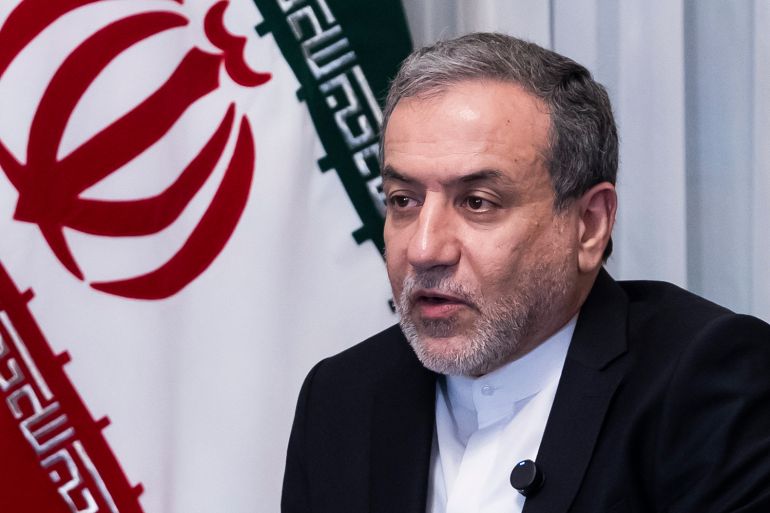Iran, European officials to hold first meeting since Israel conflict began
Iran, UK, Germany, France and EU foreign ministers to meet in bid to avoid further escalation between Israel and Iran.

Published On 20 Jun 202520 Jun 2025
Iran will hold talks with the United Kingdom, France and Germany in Geneva on Friday in an attempt to prevent an escalation in its conflict with Israel, after United States President Donald Trump said he would decide within two weeks whether to join the assault on Tehran.
“We will meet with the European delegation in Geneva on Friday,” Iran’s Foreign Minister Abbas Araghchi said in a statement, carried by state news agency IRNA.
Recommended Stories
list of 3 itemsend of list
European diplomats confirmed the planned talks in Switzerland, set to involve French Foreign Minister Jean-Noel Barrot, British Foreign Secretary David Lammy, German Foreign Minister Johann Wadephul, and European Union foreign policy chief Kaja Kallas.
Kallas and the ministers from the three European countries – known as the E3 – spoke to Araghchi earlier this week and discussed the need to return to the negotiating table and avoid further escalation. At Iran’s suggestion, the two sides agreed to meet face-to-face.
French President Emmanuel Macron said European nations were planning to suggest a negotiated solution to end the conflict. On Wednesday, he asked his foreign minister to draw up an initiative with “close partners” to that end.
Speaking in Paris after talks on the crisis with the Jordanian Foreign Minister Ayman Safadi on Thursday, Barrot said the three nations “stand ready to bring our competence and experience on this matter”.
“We are ready to take part in negotiations aimed at obtaining from Iran a lasting rollback of its nuclear and ballistic missile programmes,” he added.
Advertisement
The UK’s Lammy was scheduled to travel to Switzerland following his visit to Washington, DC, where he met US Secretary of State Marco Rubio and White House Special Envoy to the Middle East Steve Witkoff.
“We are determined that Iran must never have a nuclear weapon … A window now exists within the next two weeks to achieve a diplomatic solution,” Lammy said in a statement.
Kallas, in coordination with European countries, has insisted that diplomacy remains the best path towards ensuring that Iran does not develop a nuclear bomb.
Israel has repeatedly said its series of strikes is a preemptive move to stop Iran from obtaining nuclear weapons.
Iran denies it is building nuclear weapons and insists that its nuclear programme is peaceful. The International Atomic Energy Agency (IAEA) said it has found no evidence that Iran was building such weapons.
Trump weighs intervention
The ramping up of diplomatic efforts comes as Trump said he is weighing military action against Iran’s nuclear facilities.
Trump said on Thursday he would make up his mind within two weeks on whether Washington will get directly involved militarily in the conflict, given the “substantial chance” for renewed diplomatic negotiations over Tehran’s nuclear programme.
Iran’s well-defended Fordow uranium enrichment facility, which is buried under a mountain, is widely considered to be out of reach of all but the US’s so-called “bunker-buster” bombs.
Israeli Prime Minister Benjamin Netanyahu said he trusted that Trump would “do what’s best for America”. “I can tell you that they’re already helping a lot,” he told reporters in Beersheba.
The talks will be held in Geneva, where an initial accord between Iran and world powers to curb its nuclear programme in return for lifting sanctions was struck in 2013, before a comprehensive deal in 2015.
Trump left the Iran nuclear deal during his first term as president in 2018, defying last-ditch diplomatic efforts by his European allies to convince him otherwise.
Negotiations between Iran and the US had been taking place when Israel launched what it called Operation Rising Lion against Iran’s nuclear facilities and ballistic capabilities on June 12.
The conflict erupted with a surprise wave of Israeli attacks targeting Iranian nuclear and military sites and killing top generals and nuclear scientists.
At least 639 people, including 263 civilians, have been killed in Iran and more than 1,300 wounded since Israel launched a surprise wave of air raids against Iran a week ago, according to the US-based rights group Human Rights Activists.
Advertisement
In Israel, at least 24 people have been killed and hundreds of others wounded in Iranian attacks, according to Israeli health authorities.
